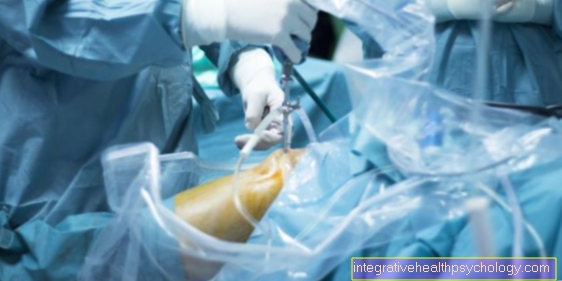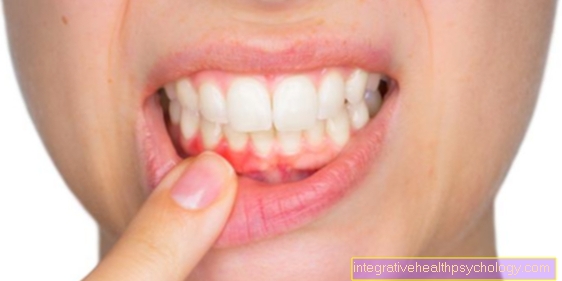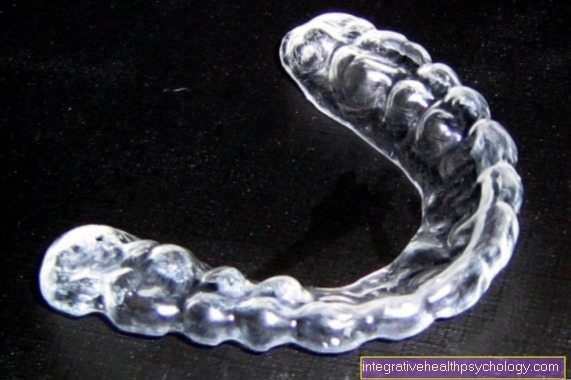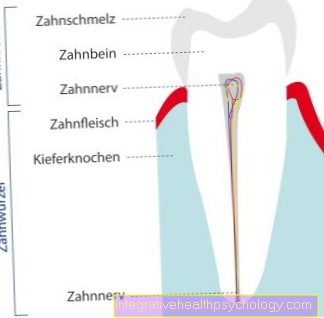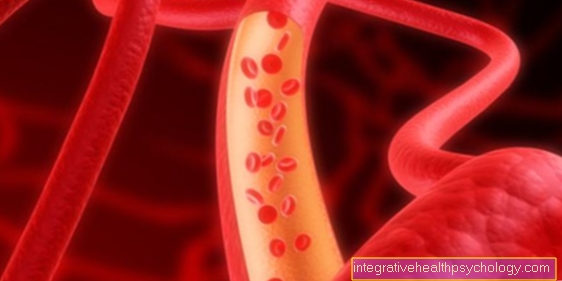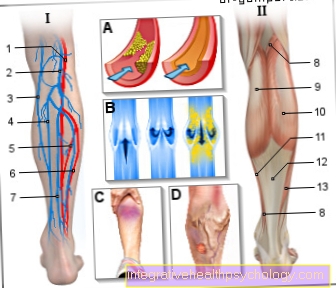Omega 3 fatty acids
introduction
Omega-3 fatty acids are a group of organic substances that fulfill a multitude of functions in the human body and are necessary for the natural course of reactions and processes. If there is a deficiency, the risk of various diseases increases.
Omega-3 fatty acids are so-called essential substances, which means that the body cannot produce them itself, or only to a limited extent. They must therefore be taken in with the food. The need can usually be met with a balanced diet.
If this is not possible due to a restricted, for example vegan diet, taking a dietary supplement with omega-3 fatty acids can be considered after consulting a doctor.

Omega-3 fatty acids are essential for everyone, whether newborns, children or adults. However, only very small amounts are required daily for the maintenance of normal body functions. With a balanced diet, where sea fish is occasionally on the menu, the natural intake is usually sufficient.
Even with a vegetarian and vegan diet, the consumption of healthy fats such as flaxseed or rapeseed oil can easily cover the needs with natural foods. Competitive athletes and pregnant women have a higher requirement for omega-3 fatty acids. If a sufficient intake through the diet is not guaranteed, the intake of a dietary supplement based on fish oil, for example, can be considered.
Even if these are over the counter, such a product should only be used on the advice of a doctor. The possible effects of omega-3 fatty acids are often advertised with very exaggerated and reinforced statements. Therefore, not every person who suffers from a disease of the heart, joints or other organs needs a dietary supplement with omega-3 fatty acids. In some cases, however, it makes sense, so that the general practitioner should be asked about the topic if necessary.
You might also be interested in this article: Nutrition in Pregnancy
What do you need omega 3 fatty acids for?
Omega-3 fatty acids fulfill a wide variety of functions in the body and are indispensable for humans. Among other things, they are an important part of the cell membrane, which gives all body cells their shape and has an important function in signal transmission.
In addition, omega-3 fatty acids are the starting substance for the production of various tissue hormones which, for example, play an important role in controlling the body's own defense system. Ultimately, you need these nutrients for good blood flow properties, protection against excessive blood clotting and a positive influence on the blood lipid level.
What does the intake of omega 3 fatty acids do?
If insufficient omega-3 fatty acids are ingested from the diet, taking it in the form of a dietary supplement helps prevent diseases associated with omega-3 deficiency. For most people, however, the intake of omega-3 fatty acids through the diet is completely sufficient.
Taking an additional food supplement then does nothing. Even if the manufacturers of such products suggest many effects such as protection against diseases and a positive influence on the appearance of the skin, joint function and many more, there is no positive effect from taking it beyond what is required. The superfluous fatty acids are then only used by the body to generate energy or to store them in fat pads.
What side effects may occur when taking it?
The amount of omega-3 fatty acids ingested through natural foods cannot cause any side effects. The fatty acids that exceed the requirement are either built into the fat cells or burned to produce energy. Side effects are only to be expected from an intake of more than 20 grams of omega-3 fatty acids per day, which can only be achieved by excessive consumption of concentrated dietary supplements.
This can lead to gastrointestinal complaints such as nausea and vomiting, flatulence and diarrhea. In addition, a massive overdose can affect blood clotting, which can manifest itself, for example, in the appearance of nosebleeds. If side effects occur as a result of taking omega-3 fatty acids, the preparation should be discontinued and a doctor should be consulted.
What forms are there?
Fish oil capsules
Most of the supplements that contain fortified omega-3 fatty acids are capsules that contain fish oil. Since high-fat types of fish are the best source of omega-3 fatty acids, they are also best suited as starting products for the production of dietary supplements. The capsules from different manufacturers can differ, for example in the type of fish that are processed.
Usually farmed salmon are used. Only a few manufacturers use oil from free-living deep sea fish such as herring, tuna or mackerel. The only difference in the end products is the price. The quality of the fish oil and the content of omega-3 fatty acids are usually the same. Another common additive in fish oil capsules is vitamin E.
This is to prevent the oil from going rancid too quickly due to decomposition. The capsules themselves are made of gelatin. The fact that the capsules are swallowed whole prevents a fishy taste from occurring when ingested.
Are these capsules also vegan?
The best source of omega-3 fatty acids are high-fat types of fish. This is why most of the dietary supplements are made on the basis of fish oil. For vegans, there are, for example, various oils that are obtained from microalgae as an alternative source of omega-3 fatty acids. In particular, during pregnancy and breastfeeding, the intake of such a product is often indicated with a vegan diet, as otherwise there is a risk of consequential damage due to a deficiency in the child.
Vegan dietary supplements with omega-3 fatty acids are usually many times more expensive because the extraction and processing is much more complex than using fish oil. Natural vegan sources of omega-3 fatty acids are vegetable fats such as flaxseed or rapeseed oil as well as green leafy vegetables and chia seeds. However, the body can utilize the fatty acids from fish or algae better.
Omega 3 fatty acids from the avocado
The avocado is one of the fruits with the highest fat content. It contains a large proportion of monounsaturated fatty acids and is therefore a healthy source of fat. In addition, it is a supplier of vegetable omega-3 fatty acids. The proportion of these polyunsaturated fatty acids in avocado is, however, rather low compared to walnuts or flaxseed, for example.
In addition, vegetable omega-3 fatty acids are not as easily usable by the body as those from high-fat fish. Nevertheless, the avocado is a very healthy fruit that also contains many other important components such as vitamins. However, due to its high calorie content, avocado should only be consumed in moderation if you are overweight.
Which foods are rich in omega 3 fatty acids?
The best sources of omega-3 fatty acids are high-fat fish such as herring, mackerel, salmon, and sardines. Consumption once or twice a week already adequately covers your needs. However, there are also plant-based foods that are rich in omega-3 fatty acids. First of all, linseed oil should be mentioned, whereby rapeseed and walnut oil are also good sources.
However, the vegetable omega-3 fatty acids are less readily usable by the body than the animal ones. Algae are an exception among the plants, which are less often on the menu. These provide just as good fatty acids as fatty types of sea fish and are therefore particularly recommended for a fish-free diet.
Read more on the subject below: Healthy oils
How is a deficiency in omega 3 fatty acids expressed?
Since omega-3 fatty acids are important in countless processes in the body and almost all organs, a deficiency can often not be clearly diagnosed. The possible symptoms can be very diverse and different and are usually very unspecific. This means that every possible symptom can be traced back to a different cause.
The most common signs of omega-3 fatty acid deficiency are muscle weakness, blurred vision, a feeling of restlessness, tiredness and skin problems. If there is an increased risk of a deficiency in omega-3 fatty acids, for example due to a vegan or vegetarian diet, this cause should be considered if several of these symptoms occur.
A doctor should be consulted to clarify the cause. It is not advisable to try to treat the symptoms by taking omega-3 fatty acids in the form of a dietary supplement without contacting a doctor. Often the complaints are based on other causes that are not discovered and, moreover, are not treated by ingesting omega-3 fatty acids. The family doctor can prove or refute the deficiency with a blood test.
What role do omega 3 fatty acids play in depression?
On the basis of scientific studies, there are various indications that a deficiency in omega-3 fatty acids favors the development of depression and that an adequate supply is a protective influence against this and other mental illnesses. However, these are by no means direct correlations that allow a statement, such as, for example, that an insufficient supply of omega-3 fatty acids triggers depression.
In one study, for example, it was found that the proportion of omega-3 fatty acids in the cell membranes of depressed patients is lower than that of healthy comparison persons. However, this is only a correlation and not proof of a cause-effect relationship. Even if these and some other results suggest a connection between the supply of omega-3 fatty acids or the development of depression, a conclusion that taking the nutrient with a dietary supplement can prevent the development of such a disease is not permissible.
In addition, the factors that play a role in the development of depression are far too extensive and complex for an effect to be expected by influencing a component such as omega-3 fatty acids. There is no question that a prevailing nutrient deficiency should be compensated for by natural or artificial sources.
You might also be interested in this article: Food supplements
Does a Baby Need Omega 3 Fatty Acids?
A sufficient intake of omega-3 fatty acids is also very important for babies. Among other things, these are required for normal development of the brain and eyes and are therefore a prerequisite for normal visual function and mental development.
Omega-3 fatty acids are transmitted through breast milk, so that nutritional supplements are not necessary for babies. The mother should take care to consume sufficient omega-3 fatty acids to meet the needs, which are increased during breastfeeding. If this cannot be achieved through a normal diet, it may be appropriate to take it through a dietary supplement.
In babies who are not breastfed, sufficient amounts of omega-3 fatty acids are usually added to the baby food. The components contained are listed on the product.
Dosage / daily requirement
The dosage when taking omega-3 fatty acids should be based on the one hand on the daily requirement and on the other hand on the amount already consumed through a normal diet. For the daily requirement, for example, you can follow the recommendations of the European Food Safety Authority (EFSA) and the German Nutrition Society (DGE).
Both organizations give a guideline value of 250 milligrams of omega-3 fatty acids as a daily requirement. However, this can vary from person to person and is increased, for example, in pregnant women or competitive athletes. Whether and in what dosage it is appropriate to take omega-3 fatty acids can be discussed with your family doctor.
price
Omega-3 fatty acids as dietary supplements are offered by various manufacturers in different dosage forms. Therefore, the prices for the products also vary a lot. If necessary, there are offers with a price reduction in the pharmacy, the drugstore or when buying on the Internet, so that the price comparison is worthwhile.
The cheapest products are often available for less than three euros, mostly in a small pack of 60 capsules, for example. Large packs usually cost up to 20 euros. Vegan products are usually the most expensive, because without the use of fish oil, production is more complex and expensive. The prices can be over thirty euros per pack.
Omega 3 fatty acids and alcohol - are they compatible?
Basically, the consumption of alcohol is compatible with the intake of omega-3 fatty acids. Since the fatty acids are not directly effective substances, no interaction is to be expected. Nevertheless, excessive or too frequent alcohol consumption is not recommended.
In addition to an addiction, there is a risk of organ damage, including liver, heart and pancreas, which can lead to premature death.
Read more on the subject below: Consequences of alcohol
Alternatives to omega 3 fatty acids
The best alternative to taking omega-3 fatty acids through dietary supplements is an adequate supply of natural foods. In addition to the regular consumption of sea fish (for example once a week), with a balanced diet, you can easily cover your needs with healthy fats such as rapeseed, linseed or walnut oil.
With these natural sources, you also consume many other important nutrients, which is not the case with a concentrated dietary supplement. If you want to do something for your health and therefore consider consuming omega-3 fatty acids, you can achieve a lot more with other measures.
A healthy lifestyle with a balanced diet, plenty of exercise and giving up smoking is the most important factor influencing the maintenance or restoration of health.
Read more on the subject below: Healthy eating
Can it be taken during pregnancy and breastfeeding?
The intake of omega-3 fatty acids is possible both during pregnancy and while breastfeeding. It may even be advisable to take omega-3 fatty acids in the form of a dietary supplement during pregnancy.
This is especially true for women who cannot or insufficiently cover their needs through natural nutrition, for example because they do not eat sea fish. During pregnancy, the need for omega-3 fatty acids is higher than usual. A sufficient supply is important for the normal development of the eyes and brain of the growing child.
Sufficient nutrition for the mother is also important when breastfeeding, as the omega-3 fatty acids are transferred to the infant through breast milk. Whether it makes sense for the mother to take a dietary supplement can be discussed with the family doctor or gynecologist.
Effectiveness of the pill
The effectiveness of the pill or other hormonal forms of contraception is not impaired in any way by taking omega-3 fatty acids. There is therefore no need to pay attention to a delayed intake. Also, the breakdown of hormones absorbed by the pill is not affected by the intake of omega-3 fatty acids, unlike some medications.






